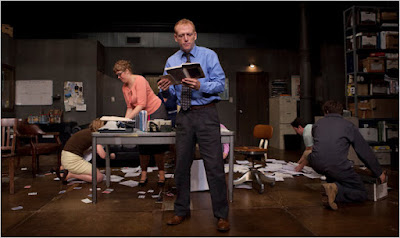 |
| What is he doing? Reading a novel or dramatizing it? |
When new and interesting things go on in the arts, it’s often about crossing genres - mixing music with poetry or painting, dance with drama, film with just about anything. recently I experienced a couple of amazing collisions: music and architecture, drama and the novel.
 |
| The LSO unpacks at St Paul's. |
Apparently this piece is performed every few years in St Paul’s, to kick off the City of London Festival. I quote from Guy Dammann’s review in the Guardian:
If your sense of aw lacks an existential dimension, Berlioz’ great Requiem will restore it. Being enveloped by the omnidirectional swell of sound at the onset of the Tuba Mirum, or dangled on the yo-yo of hope and despair that the Lacrimosa spins with such masterful theatricality, are not experiences one forgets.
One of the wonders of hearing this piece in this space, is how the quieter sections emerge with the greatest impact. While the tumults of the four brass bands of the apocalypse are still raging, the subdued desperation of the soprano’ cry of “salva me” just manages to escape, its quiet insistence intensified precisely because it reverberates in our minds rather than in the further reaches of Wren’s great dome.
The conductor was the venerable an fragile old Sir Colin Davis, and the lone soloist was tenor Barry Banks.
Now playing at the Noel Coward Theatre is an 8.5 hours theatrical marathon that is receiving rave reviews. It is a performance visiting fro New York, and performed by a theatre group called Elevator repair Service. And yes, they really do this: they read every line of F. Scott Fitzgerald’s novel “The Great Gatsby”, every “he said” and “she said”. Every word.
At first I wasn’t sure it worked. After the first couple of hours I felt that I was reading a novel in a less comfortable way, unable to put it down or take a tea break: force fed, as it were. Then after a long dinner interval, I settled down and started to see what the company was adding to the novel: comic lines where I hadn’t noticed them, subtle characterisations, some visual admixture...kind of like reading a novel via someone else’s head. A strange and extremely interesting experience.
And the company did manage to build up to the tense and dramatic climax of the story - and this even though the whole thing was set in a very dreary office, the central character starting as a bored office worker reading the novel, but soon assuming the character of the narrator Nick. His office co-workers assumed the other character roles as the story progressed, and the whole thing was remarkably convincing. A success.
Huge kudos to the whole company for the marathon effort. But a very special bouquet must go to Scott Shepherd, playing “Nick”, whole read the whole novel. Every word.
And on the subject of cross-genre, let me repeat an apposite quotation from the program:
“[Nick Carraway] is both stage manager and chorus, recreating situations in all their actuality, and at the same time commenting upon them. Sometimes he even devises the action - contrives the circumstances by which the actors are brought together on the stage: it is he who arranges the reunion of Gatsby and Daisy.” - Brian Way.Read some comments here.
And a great review from the NYT.
 |
| Nick reads on, through the party scene. |
And Aurora take it further.....
And now in my in-box comes an invitation to the Aurora Orchestra’s latest gig - Aurora are past masters of cross genre collaboration, commissioning paintings to accompany their music, adding a bluegrass band into their classical music mix. But this time they look likely to excel themselves. Here’s the description:
maxamorphosis maksemawfesis/ noun [zoology; musicology; choreography] rare process of transformation involving endangered species of violus-saltator(viola-dancer). Reaction commonly initiated by contact with simultaneous varying tempi and whispering strings, with resultant flutters in the piccolo and marimba. Also reliant on gradual release of enzymes (C+G+D+A) by specimen. Process discovered July 2012 by Julian Philips and Mickaël 'Marso' Rivière. A collaboration between composer Julian Philips and choreographer Mickaël 'Marso' Rivière, Maxamorphosis features Max Baillie as viola soloist alongside Aurora Orchestra and dancers from Company Decalage and Bboy's Attic.
Read all about it here.
 |
| Break dance meets classical music. |
Images from:
http://www.gatzlondon.com/
http://www.maltbury.com/blog/tag/gatz/
http://theater.nytimes.com/2010/10/07/theater/reviews/07gatz.html
http://www.bbc.co.uk/programmes/galleries/p00vbwxs
http://www.auroraorchestra.com/event/battle/
http://www.gatzlondon.com/
http://www.maltbury.com/blog/tag/gatz/
http://theater.nytimes.com/2010/10/07/theater/reviews/07gatz.html
http://www.bbc.co.uk/programmes/galleries/p00vbwxs
http://www.auroraorchestra.com/event/battle/


No comments:
Post a Comment